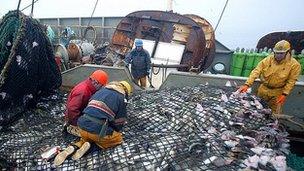Fishing deal: EU ministers criticised
- Published

French cod catch: Many of Europe's fish stocks are seriously depleted
EU ministers have reached a provisional deal to reshape the Common Fisheries Policy, long blamed for overfishing.
The deal has been hailed by the UK environment ministry Defra but criticised by the EU fisheries commissioner and environmentalists.
A Commission source told 大象传媒 News the new funding arrangements would continue to promote overfishing.
He said measures to support selective nets that avoided discards would be outweighed by funds for bigger engines.
The deal took away with one hand but gave with the other, the source said.
Under current arrangements EU funding has increased the capacity of fleets and led to widespread over-exploitation of fish stocks.
The new plan is to help fleets switch to more sustainable fishing. It is part of the 10-year reform of
The reform aims to eradicate "discards" - the practice of dumping tonnes of perfectly good fish back into the sea - dead - in order to meet quota targets.
But EU Fisheries Commissioner Maria Damanaki says the ministers' deal is weaker than the Commission wanted.
Greenpeace environmentalists say ministers have sold out to the economic interests of the industrial fishing sector by also agreeing to continue subsidies for the modernisation of vessels and their engines, which will increase capacity rather than reducing it.
Greenpeace believe the majority of the funds will still be taken by large fishing companies to increase capacity through new boats and engines.
The group's EU fisheries policy director Saskia Richartz said "there is already not enough fish for all the boats out there, so it makes no sense at all for governments to continue throwing subsidies at the EU's oversized fleet.
"Wasting taxpayers' money on what causes the problem in the first place is ridiculous - it is like paying someone to rob you."
UK government upbeat
The size of the European Maritime Fisheries Fund (EMFF) is yet to be decided in EU budget talks for the next financial period, 2014-2020.
The UK Fisheries Minister Richard Benyon said: "I am delighted that the Council has agreed to allocate the vast majority of the new EU funding stream towards implementing CFP reform.
"The priority for me has always been to make the changes - that will be so vital for a reformed Common Fisheries [Policy] - a reality, and this outcome signifies a major step towards that vision. We are moving ever closer to the UK goal of being able to create healthy fish stocks, a prosperous fishing industry and a healthy marine environment."
The original Commission proposal will be reviewed next by the European Parliament and may be further amended before becoming law.
The Commission source told the 大象传媒 that it would be left largely to the discretion of member states to apportion the money as they saw fit.
The UK would probably use the cash to make fishing more sustainable, but France would be likely to give most cash to large-scale fishing firms to increase the power of their fleets, the source said.
Roberto Ferrigno from the green group WWF said EU governments "are keeping to business-as-usual by using taxpayers' money to subsidise a spate of destructive, unrealistic and unjustified fishing and aquaculture activities.
"EMFF funds should instead support measures aimed at improving data collection and scientific knowledge of fish stocks, promoting the dissemination and adoption of selective fishing gears; and ultimately improving the state of fish stocks, the well-being of coastal communities and the fishing industry."
Follow Roger on Twitter
- Published11 October 2012
- Published28 May 2012
- Published6 February 2013